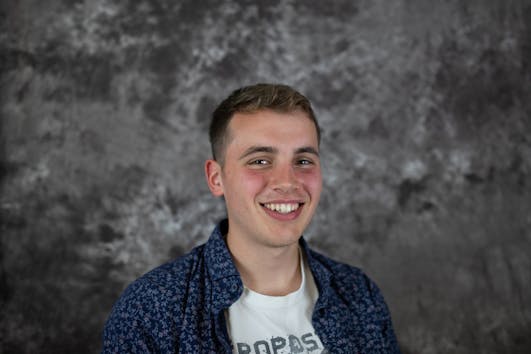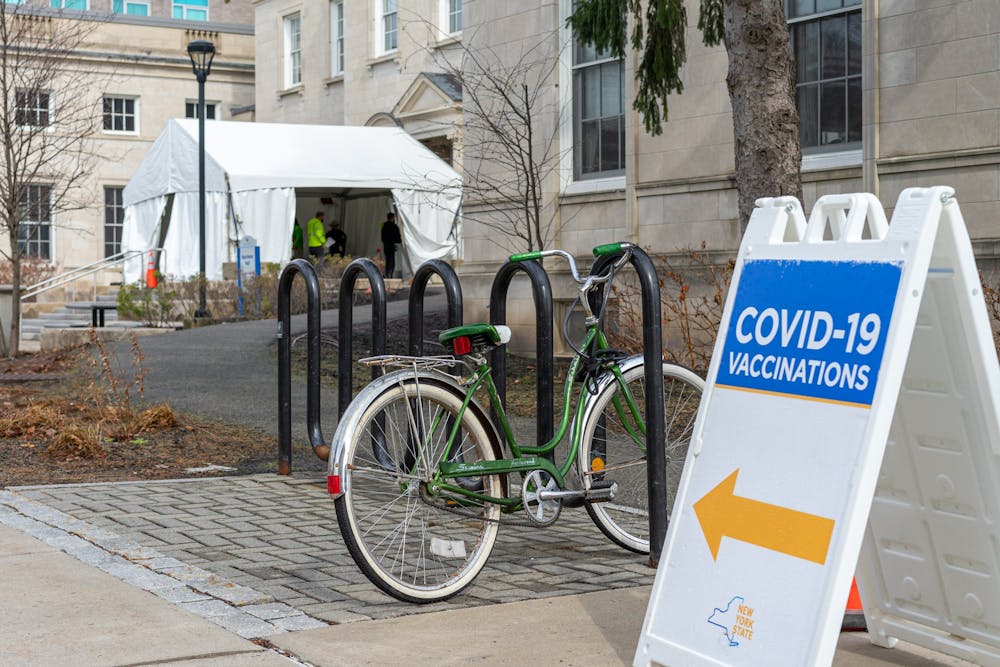SUNY and UB will continue to recommend, but not require, booster shots for students, faculty and staff — at least for now.
SUNY and UB officials have been discussing and planning for a potential booster mandate, UB spokesperson Cory Nealon and SUNY spokesperson Jackie Orchard said.
SUNY will continue to follow federal and state guidelines from the FDA, CDC and New York State Department of Health regarding a booster mandate, Orchard said. For instance, as per comments from Orchard and a July memo from SUNY Chancellor Jim Malatras, if the federal government changes the definition of “fully vaccinated” to only include those who’ve received a booster shot, SUNY will change its definition accordingly.
In the meantime, SUNY will work with all its campuses to implement its booster education and awareness program, which includes a social media strategy and student outreach efforts, according to Orchard.
“From day one, SUNY has been leading the way in COVID-19 vaccination efforts to ensure our students, faculty and staff have the safest learning environment possible,” Orchard said. “Vaccinating the community against COVID-19 remains the most effective way to ensure a safe on-campus environment for all, and our policies have evolved based on the latest science, data and information available.”
A booster mandate would come from SUNY, not UB, UB spokesperson John DellaContrada said.
But in an effort to increase booster vaccination rates in the absence of a mandate, “UB leadership [and University Communications] have developed messaging urging UB students, faculty and staff to get the booster and explaining the protective benefits of getting a booster shot,” Nealon said.
Thomas Russo, chief of the Division of Infectious Diseases in the UB Department of Medicine and member of the university’s Health Guidelines Committee, said he has “no idea” if SUNY will implement a booster mandate. Still, he said, UB community members should get their booster shots as soon as possible because their level of immunity will increase by “tenfold or greater,” but only after two weeks.
“Unfortunately there are still young healthy people who — for reasons that we don’t understand, likely some combination of genetics and maybe a huge exposure [to COVID-19] — do poorly and end up in the hospital or worse,” Russo said. “A booster shot is going to minimize those chances, there’s no question about it.”
A booster shot also prevents students from transmitting COVID-19 to those around them and from developing minor symptoms like “loss of taste or smell, headaches, fatigue, fever, muscle aches, shortness of breath [and] brain fog,” Russo said.
“How would you like to have any one of those symptoms, furthermore, a combination of those symptoms, and now you’ve got to write your term paper, your exams and all that?” Russo said. “And sometimes these symptoms can last weeks or months and really affect your daily life.”
While he believes all students should get a booster shot, those who received the single-dose Johnson & Johnson vaccine are especially at risk without one, Russo said.
“[Boosters] are really important if you got Johnson & Johnson because the degree of protection with Johnson & Johnson is significantly lower, not only for any sort of infection, but also for hospitalizations and more serious disease, relative to Moderna and Pfizer,” Russo said. “And I would strongly recommend getting an RNA [booster] vaccine — a Moderna or Pfizer — if you got Johnson & Johnson, because that generates a much higher level of antibodies than if you get two [doses of] Johnson & Johnson.”
The CDC expanded booster eligibility late last month to include anyone older than 18 who completed a Pfizer or Moderna vaccine series more than six months prior. That waiting period drops to two months for those who received the Johnson & Johnson vaccine.
Through a partnership with a local pharmacy, UB is offering booster shots on a walk-in basis at weekly clinics on each of the university’s three campuses. The clinics will only operate through Dec. 16, but “UB is in discussions about extending the clinics into next semester,” Nealon said.
“The university is very pleased that many members of the UB community have utilized these clinics,” Nealon said.
The university did not have “firm data” regarding how many shots on-campus clinics administered.
Anyone who is eligible for a booster shot, whether affiliated with UB or not, can get one at the state-run vaccine clinic at Harriman Hall on South Campus. That clinic “will continue to be open for the foreseeable future,” Nealon said.
Approximately 99% of UB students completed a vaccine series. As of late September, 578 students were exempt for religious or medical reasons, but that number has likely decreased as some students may have gotten vaccinated over the course of the semester, DellaContrada said.
But neither the university nor SUNY have kept track of how many students have received their booster shots.
“Because boosters are not a SUNY requirement, UB does not have official data to share at this point,” Nealon said.
SUNY enabled individual campuses to submit data regarding the portion of students who received booster shots on Nov. 15 and expects to get that data soon, according to Orchard.
At the time of publication, UB has 93 positive cases and a 2.14% positivity rate based on a 14-day rolling average, according to SUNY’s COVID-19 Tracker. The university’s positivity rate is much lower than Erie County’s, which sits at 11% based on a 14-day rolling average, according to The New York Times.
Erie County recently reimposed an indoor mask mandate in late November due to its caseload, according to WKBW.
The comparatively low positivity rate “is due to the overwhelming majority of students and employees being fully vaccinated, and their adherence to UB’s health and safety guidelines,” Nealon said.
But the recently discovered Omicron variant is the “wild card” at play in the discussions surrounding booster mandates, Russo said.
First detected in South Africa in late November, the Omicron variant has infected people in at least 50 countries and 19 U.S. states and has become the dominant strain in southern Africa, according to CNBC. Little is known about the variant so far, but Anthony Fauci, director of the NIH, said Omicron appears to be more transmissible but less severe, according to the BBC.
“UB officials are continuously monitoring all aspects of the pandemic, including new variants such as Omicron,” Nealon said. “At this time, UB has not altered its health and safety guidelines in response to the Omicron variant but we continue to closely monitor the variant and adjust as needed and as new guidelines are recommended or required by health officials and SUNY.
“In the meantime, the university strongly encourages all members of the UB community to remain vigilant by continuing to follow best practices, such as masking while inside, practicing good hygiene, getting vaccinated and getting a booster shot when eligible.”
SUNY will continue to work with its own experts and the state health department to determine if the new variant will make policy changes necessary, according to Orchard.
While over 1,100 U.S. colleges and universities have required vaccination against COVID-19, very few have required booster shots so far, according to The Chronicle of Higher Education. Wesleyan University, Syracuse University and Smith College, all private institutions, are among the first to mandate booster shots.
Grant Ashley is a senior news/features editor and can be reached at grant.ashley@ubspectrum.com

Grant Ashley is the editor in chief of The Spectrum. He's also reported for NPR, WBFO, WIVB and The Buffalo News. He enjoys taking long bike rides, baking with his parents’ ingredients and recreating Bob Ross paintings in crayon. He can be found on the platform formerly known as Twitter at @Grantrashley.





